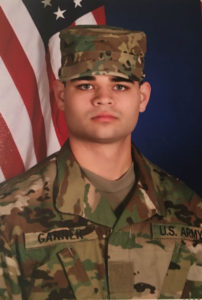 Army Pvt. Alexander Garner has graduated from basic combat training at Fort Sill, Lawton, Okla.
Army Pvt. Alexander Garner has graduated from basic combat training at Fort Sill, Lawton, Okla.
During the nine weeks of training, the soldier studied the Army mission, history, tradition and core values, physical fitness, and received instruction and practice in basic combat skills, military weapons, chemical warfare and bayonet training, drill and ceremony, marching, rifle marksmanship, armed and unarmed combat, map reading, field tactics, military courtesy, military justice system, basic first aid, foot marches and field training exercises.
Garner is the son of Michael and Denise Garner of Athens. He is the older brother of Nathan Garner.
He is a 2014 graduate of Athens High School.
Military Criminal Justice System Explained
The military justice system is the primary legal enforcement tool of the armed services. It is similar to, but separate from, the civilian criminal justice system. The Uniform Code of Military Justice, first enacted in 1950, is the principal body of laws that apply to members of the military. Military tribunals interpret and enforce it.
There are several rationales for a separate military justice system. The system’s procedures are efficient and ensure swift and certain decisions and punishments, which are essential to troop discipline. By comparison, the civilian criminal justice system can be cumbersome and slow and may yield unanticipated or inconsistent results. Speedy trials and predictable decisions aid the military in its effort to maintain order and uniformity. This, in turn, contributes to national security. In addition, the court-martial system fulfills the civilian public’s expectation of a disciplined and efficient military.
In addition to enhancing discipline, order, uniformity, efficiency, and obedience, the UCMJ addresses certain offenses that are unique to the military, such as desertion, insubordination, or absence without leave. Finally, the military requires a uniform system that can be administered at the location of the crime to adjudicate offenses committed by service members outside U.S. jurisdiction.
The jurisdiction of the military courts is established when the court is properly convened, the membership of the court satisfies the requirements of the UCMJ, the court has the power to try the accused, and the offense is addressed in the UCMJ. The UCMJ provides that military courts have jurisdiction over all members of the armed services and certain civilians who meet limited, well-defined criteria.
According to court martial lawyers, the three tiers of military courts are courts-martial, Courts of Criminal Appeals, and the United States Court of Appeals for the Armed Services.
Courts-Martial The three types of courtsmartial—summary, general, and special—comprise the trial level of the military justice system. Courts-martial were originally authorized by an amendment to the Articles of War (Act of March 3, 1863, ch. 75, sec. 30, 12 Stat. 736). The amendment gave courts-martial jurisdiction over military personnel in times of war, insurrection, or rebellion to prosecute such crimes as murder, ROBBERY, ARSON, BURGLARY, rape, and other common crimes. The UCMJ authorizes military commanders to convene courts-martial on an ad hoc basis to try a single case or several cases of service members who are suspected of having violated the code.
Summary Courts-Martial Summary courts-martial adjudicate minor offenses. Their jurisdiction is limited to enlisted personnel. Summary courts-martial may impose a sentence of confinement for not more than one month, hard labor without confinement for not more than 45 days, restriction to specified limits for not more than two months, or FORFEITURE of not more than two-thirds of one month’s pay (UCMJ art. 20, 10 U.S.C.A. § 820). Although the summary court-martial is intended to dispose of petty criminal cases promptly, it must fully and fairly investigate both sides of the case. Nevertheless, the protections guaranteed in special or general courts-martial are diminished in a summary hearing. Therefore, a summary court-martial may be conducted only with the consent of the accused.
The defendant in a summary court-martial may consult with military counsel before trial but is not entitled to military defense counsel at the hearing. A summary court-martial is presided over by a single commissioned officer who conducts the trial with minimal input from adversarial counsel and acts as judge, fact finder, and counsel. Thus, a summary court-martial is more similar to the inquisitorial courts of the civil-law system than to the Anglo-American adversarial model. Summary courts-martial are employed less frequently than are other types of courts-martial. With increased recognition of the constitutional rights of the accused during the last part of the twentieth century, their use has greatly diminished.
Special Courts-Martial A special court-martial generally consists of a military judge and at least three armed-service members. However, under Article 16(2) of the UCMJ (10 U.S.C.A. § 816(2)), the members may sit without a judge, or the accused may choose to be tried by a judge alone.

Congratulations, Pvt. Garner …and thank you for serving our Country! Spent my last year of active duty at Ft Sill when I returned home from Vietnam in 1970. May God bless you as you go through your advanced training, and throughout the rest of your time in the Army.
So proud of you Alex for serving our country!